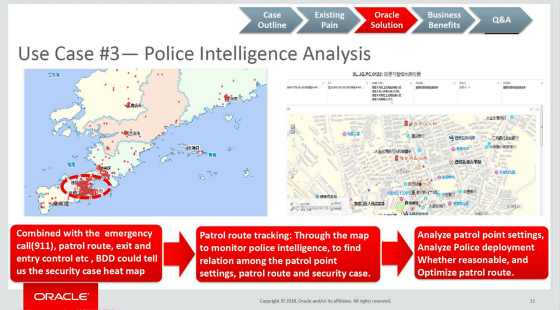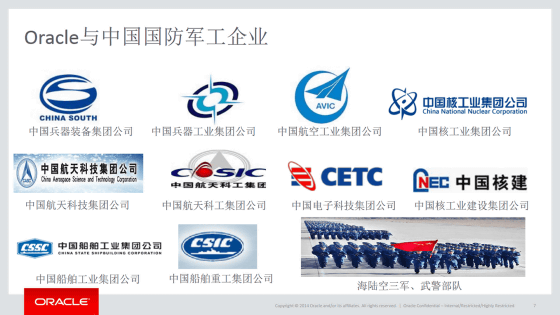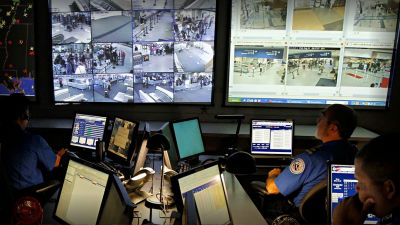Oracle points out that it 'sells data analysis tools used to crack down on the people' in China

How Oracle Deals Repression in China
https://theintercept.com/2021/02/18/oracle-china-police-surveillance/
According to The Intercept, at a developer conference held at Oracle's California headquarters in 2018, a Chinese Oracle engineer gave a presentation on 'Oracle products used by Liaoning police for crime analysis and prediction'. ..
The slide material used in the presentation describes the Oracle software used by Liaoning police for criminal investigations, where police track people and events based on vast datasets to identify potential suspects. It is said to have helped to do so. You can also see that the material on the slide uses a map of the Liaodong Peninsula .

In addition, a page titled 'Oracle and the Defense Industry' in another slide document created by Oracle lists the names of institutions such as the

The Intercept said it is unclear whether Oracle products are actually used in China's defense industry, but it is clear that China's defense agencies are targeted in Oracle's marketing. 'Oracle should not have business with any public security agency, which is the Western country for China to build surveillance systems,' said Maya Wang, senior researcher at
In a statement to The Intercept, Oracle spokeswoman Jessica Moore said the material is just 'what you can do with Oracle products' and shows sales to specific agencies and actual use cases. I argue that it is not a thing. Transactions with public security organizations such as China are inconsistent with Oracle's core values and human rights (PDF file) declaration, and all Oracle transactions are more conservative and cautious than legally regulated. Claims to be.
Meanwhile, Xavier Lopez, a former senior director of Oracle, testified that at the 2017 Oracle annual conference, the Chinese police announced a 'use case for Oracle products.' In the presentation given by Mr. Lopez, the Chinese police station used Oracle's analysis software and based on public data such as documents, SNS, web contents, chats, flight records, hotel stay records, suspects He explained that he succeeded in identifying.
According to Lopez, he forgot exactly which city the Chinese police station explained in the presentation belonged to, but claimed to have made the presentation based on data provided by the administration. In response, Moore said, 'We have not confirmed the implementation of Oracle products in Chinese police stations,' but third parties and operators in each country, including China, are using Oracle technology to introduce new products. I admitted that it is possible to make it.

According to The Intercept, Oracle isn't the only provider of data analysis tools in China. In addition to several U.S. government agencies such as the Chicago Police Department and the Illinois State Police, police in countries where law enforcement agencies such as Brazil, Mexico, Pakistan, Turkey, and the Arab Emirates are concerned about human rights violations have Oracle analysis tools. It is said that it is being used. Although the marketing material states that Oracle's technology helps predictive policing to prevent crime based on criminal investigations and predictions, The Intercept claims that this is a suspicious claim even in countries where citizens' rights are protected. Pointed out.
Police can justify any decision using big data, especially in countries such as China where accountability to citizens is not sufficient. 'In general, the democratic system must respond to resistance and opposition from discriminated people, but in China, police need to respond to any pressure,' said Wang of Human Rights Watch. There is no such thing, which could further extend the imperfect design of the system. '
Oracle's technology makes it possible to collate and analyze data on traditional police-owned crimes, data collected from surveillance systems such as facial recognition, and vast amounts of data, including social media posts. Integrating data from the physical and digital worlds into criminal investigations is explained by the concept of '
The Intercept cites Hong-Eng Koh, a former Singaporean police officer who worked for Oracle from 2010 to 2016, as a strong proponent of integrated policing with Oracle products. Koh posted to LinkedIn that he had successfully implemented a police solution in countries where law enforcement agencies such as China, Brazil and the United Arab Emirates are concerned about human rights abuses. In addition, Mr. Koh left Oracle in 2016 after working in China for two years from around 2014, and he is working at Huawei at the time of writing the article.
Mr. Koh is in the center of the picture below. Standing to the left and right are Rio de Janeiro police officials who allegedly pitched Oracle products.

Contracts with police around the world continued after Koh left Oracle, and from 2011 to 2019, he also traded with police and public security authorities in the Xinjiang Uygur Autonomous Region of China, where persecution of Muslims is a problem. The Intercept points out. An Oracle spokeswoman, Moore, also admitted that he was doing business with the Xinjiang Uygur Autonomous Region authorities, but said he hadn't done so since the US imposed sanctions in 2019.
In response, The Intercept argued that the persecution of Uighurs in Xinjiang Uighur Autonomous Region had been a global issue for at least a year before Oracle closed its deal with police in Xinjiang Uygur Autonomous Region. Oracle was aware of the Xinjiang Uygur Autonomous Region issue, but accused it of continuing to do business with police until sanctions were imposed by the US government.
The Intercept pointed out that the problem of Oracle selling products to Chinese authorities is not limited to suspicion of human rights violations, but could also be a national security issue. As an example, he pointed out that Oracle has been working closely with the US government since it built the CIA database in the 1970s.
Jack Paulson, executive director of Tech Inquiry , a non-profit organization investigating the impact of technology companies on military and law enforcement agencies, said: 'At the same time that Oracle executives decide on US national security policy, China's We are concerned that we are providing intelligence technology to the police. '

Related Posts:
in Software, Posted by log1h_ik






